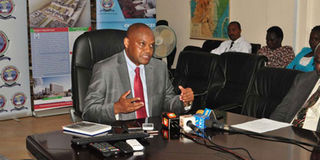Cuban doctor at Moi hospital researches mystery killer disease

Dr Wilson Aruasa, CEO of Moi Teaching and Referral Hospital in Eldoret, addresses the press at the Chandaria Cancer and Chronic Disease Centre on September 12, 2018. PHOTO | DENNIS LUBANGA | NATION MEDIA GROUP
What you need to know:
- The disease is said to killed eleven family members in a span of two decades.
- On Tuesday, Dr Castillo said it could be hereditary and that their findings will determine the kind of medication patients admitted to that hospital will receive.
- MTRH Chief Executive Officer, Wilson Aruasa, said it might take at least one month to properly identify the disease.
- According to Mr Richard Lang'at, a family member, the disease first rendered the patients unable to speak and then caused paralysis.
A Cuban doctor based at Moi Teaching and Referral Hospital in Eldoret, Uasin Gishu County, is leading a team in diagnosing an unknown disease that has affected five family members from Londiani in Kericho.
Dr Jamila Castillo, a neurologist, is among doctors sent to Kenya from the Caribbean country in 2018 under an exchange programme.
The disease is said to killed eleven family members in a span of two decades.
On Tuesday, Dr Castillo said it could be hereditary and that their findings will determine the kind of medication patients admitted to that hospital will receive.
GENETICS
MTRH Chief Executive Officer, Wilson Aruasa, said it might take at least one month to properly identify the disease.
“Getting the right diagnosis for this condition will take time. This is because it involves studies on genetics. It will take up to a month or so,” Dr Aruasa told the Nation by phone on Tuesday.
He added, “The five family members brought to our facility last week are now stable. They already underwent reviews by our neurologists."
Among the relatives is a one-year-old baby.
MISDIAGNOSIS
A group of doctors from MTRH has visited the family's home in Londiani as part of the diagnosis procedure.
According to Mr Richard Lang'at, a family member, the disease first rendered the patients unable to speak and then caused paralysis.
“Though they have an appetite, they become very weak with every passing day. They then start staggering while walking and have memory loss," he said.
"They also develop mouth sores. These symptoms last for some time and they eventually die."
Mr Langat said there had been several cases of misdiagnosis, including one of typhoid.
“Doctors say it is typhoid but they [the patients] do not to respond to typhoid treatment,” he said.




